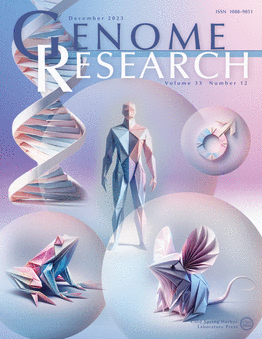Adaptation of centromere to breakage through local genomic and epigenomic remodeling in wheat
IF 5.5
2区 生物学
Q1 BIOCHEMISTRY & MOLECULAR BIOLOGY
引用次数: 0
Abstract
Centromeres, characterized by their unique chromatin attributes, are indispensable for safeguarding genomic stability. Due to their intricate and fragile nature, centromeres are susceptible to chromosomal rearrangements. However, the mechanisms preserving their functional integrity and supporting nucleus homeostasis following breakages remained enigmatic. In this study, we use wheat ditelosomic stocks, which arise from centromere breakage, to explore the genetic and epigenetic alterations in damaged centromeres. Our investigations unveil novel chromosome end structures marked by de novo addition of telomeres, as well as localized chromosomal shattering, including segment deletions and duplications near centromere breakpoints. We reveal that the damaged centromeres possess a remarkable capacity for self-regulation, through employing structural modifications such as expansion, contraction, and neocentromere formation to maintain their functional integrity. Centromere breakage triggers nucleosome remodeling and is accompanied by local transcription changes and chromatin reorganization, and subsequently may contribute to the stabilization of broken chromosomes. Our findings highlight the resilience and adaptability of plant chromosomes in response to centromere breakage, and provide valuable insights into the stability of centromeres, thereby offering promising prospects to manipulate centromeres for targeted chromosomal innovation and crop genetic improvement.小麦着丝粒通过局部基因组和表观基因组重塑适应断裂
着丝粒以其独特的染色质属性为特征,在维护基因组稳定性方面是不可或缺的。由于其复杂和脆弱的性质,着丝粒易受染色体重排的影响。然而,保持其功能完整性和支持破坏后核稳态的机制仍然是谜。在这项研究中,我们利用小麦着丝粒断裂产生的二染色体种群来探索受损着丝粒的遗传和表观遗传变化。我们的研究揭示了新的染色体末端结构,其特征是端粒的重新添加,以及局部染色体破碎,包括着丝粒断点附近的片段缺失和复制。我们发现受损的着丝粒具有显著的自我调节能力,通过结构修饰,如扩张、收缩和新着丝粒的形成来维持其功能的完整性。着丝粒断裂触发核小体重塑,并伴随着局部转录变化和染色质重组,随后可能有助于断裂染色体的稳定。我们的研究结果突出了植物染色体对着丝粒断裂的恢复和适应性,并为着丝粒的稳定性提供了有价值的见解,从而为操纵着丝粒进行针对性的染色体创新和作物遗传改良提供了广阔的前景。
本文章由计算机程序翻译,如有差异,请以英文原文为准。
求助全文
约1分钟内获得全文
求助全文
来源期刊

Genome research
生物-生化与分子生物学
CiteScore
12.40
自引率
1.40%
发文量
140
审稿时长
6 months
期刊介绍:
Launched in 1995, Genome Research is an international, continuously published, peer-reviewed journal that focuses on research that provides novel insights into the genome biology of all organisms, including advances in genomic medicine.
Among the topics considered by the journal are genome structure and function, comparative genomics, molecular evolution, genome-scale quantitative and population genetics, proteomics, epigenomics, and systems biology. The journal also features exciting gene discoveries and reports of cutting-edge computational biology and high-throughput methodologies.
New data in these areas are published as research papers, or methods and resource reports that provide novel information on technologies or tools that will be of interest to a broad readership. Complete data sets are presented electronically on the journal''s web site where appropriate. The journal also provides Reviews, Perspectives, and Insight/Outlook articles, which present commentary on the latest advances published both here and elsewhere, placing such progress in its broader biological context.
 求助内容:
求助内容: 应助结果提醒方式:
应助结果提醒方式:


